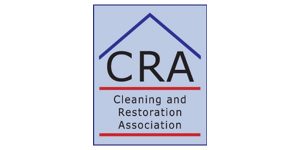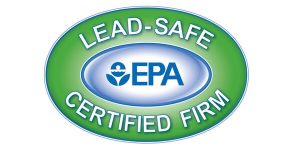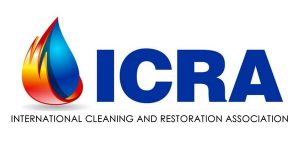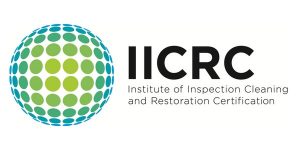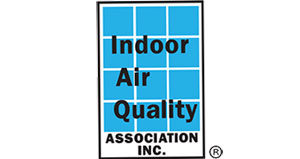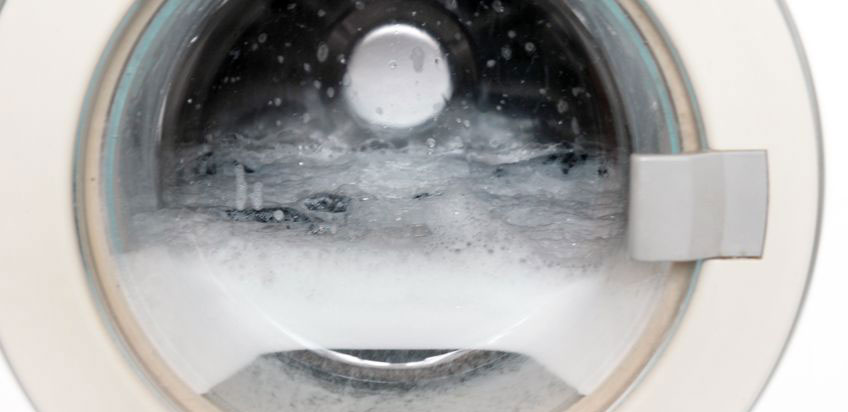
Washing machines are among the top-10 causes of water damage in the home. Yes, a clothes-washer can damage your home, with water damage restoration costs exceeding a thousand dollars even with homeowners insurance. And it can happen at any time, 24 hours a day. Which is a shame because washing machine floods can be prevented. We’ll explain how, including a couple of tips. Plus a third tip that’s critical to your safety! Proper care and maintenance are always important, as insurance won’t cover losses that were preventable.
Burst Washing Machine Hose
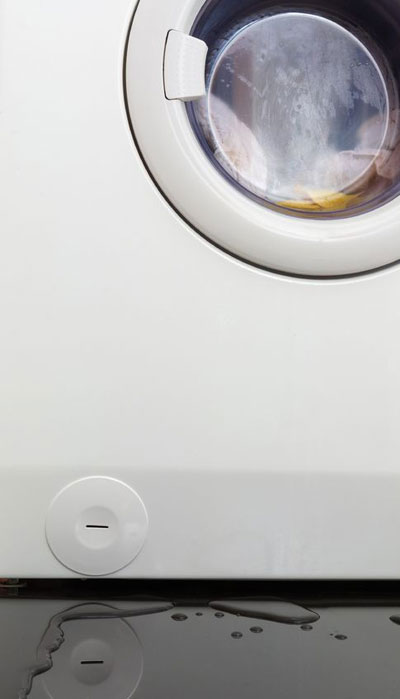 A burst hose is the most common problem, accounting for about half of all washing machine water damage claims. The water supply lines provide on the order of 4 times that of a water-conserving shower head, some 10 gallons per minute. That might not seem like much, but that’s 600 gallons in your home in a single hour.
A burst hose is the most common problem, accounting for about half of all washing machine water damage claims. The water supply lines provide on the order of 4 times that of a water-conserving shower head, some 10 gallons per minute. That might not seem like much, but that’s 600 gallons in your home in a single hour.
Tip #1: Turn off the washer’s water supply line valves when you’ll be away for the weekend or longer.
The general advice is to replace those hoses every 5 to 6 years. And much more often than that check for signs of problems such as blistering or swelling, wear, and cracks. You should check that connections are tight and that the hoses aren’t stretched taught several times each year. And when it’s time for replacement, forget those old rubber hoses. Get only steel-reinforced hoses.
Buying premium washer hoses every 5 years may seem like an unnecessary expense, but considering that water damage repairs from a burst hose commonly runs to hundreds and even thousands of dollars those hoses are a great bargain. Besides, they’re only around $30 a pair and you can install them yourself. If your washer is on the second-floor or near a carpeted area, make that upgrade right away.
Overflow
A clothes-washer can overflow as a result of a variety of mechanical failures. The classic repair ad is a picture with a mountain of suds. But more often there’s a sewer line or drain line backup. Be especially wary if you’ve been experiencing several slow-draining plumbing fixtures as well as after a rain storm.
Leaks
Most washing machine damage is caused by machines that are under 10 years old. Besides burst hoses and overflows, leaks often occur in pumps, valves, and fittings that have been put under extra strain due to overloading.
Tip #2: To avoid leaks and overflows, don’t overload your washer. That will also help it last longer.
About Water Damage
Most people underestimate the potential for water damage. If not caught immediately, surprisingly large amounts of water get trapped under the floor and behind walls. In just a couple of days that leads to bacteria and mold growing and progressive destruction of wood and drywall. Even when surfaces appear dry, progressive damage can go on for weeks.
Our water damage restoration process mitigates against all of that. First, water extraction with extra-powerful vacuums removes as much surface water as possible. Then we’ll use professional dehumidifiers and blowers to pull out deep down dampness, getting all moisture down to safe levels in just a few days. Our anti-microbial specialist will also attend to disinfection and mold remediation.
Safety First!
With washing machine floods, what’s the first thing you should do? Shut off the water? Unplug the machine? Nope!
Tip #3, Safety: Water and electricity don’t mix. The first step in any flooding situation is to use the right circuit breaker to shut off electrical power to the affected area. Otherwise, there’s a significant electrocution hazard.
Home Insurance Coverage
Water damage is the most common home insurance claim, and clothes washers are among the main culprits. You may have read that water damage from a washer is covered by regular homeowner policies. But that’s true only for sudden causes that weren’t reasonably preventable. Even if covered you’ll be paying the deductible on what could be several thousand dollars of damage restoration. So pay attention to proper maintenance!
Service First
We provide the full range of damage restoration services, including water damage restoration. Our experts with the latest in technology are ready with prompt emergency service 24/7.



